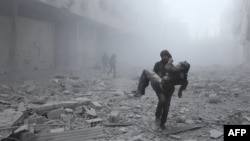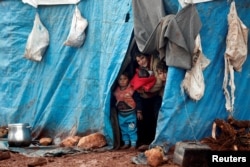The United Nations is calling for an immediate cease-fire in Syria to allow for the delivery of life-saving aid to millions of civilians who are without food, medicine and other essential needs.
The U.N. says it needs at least a one-month humanitarian pause in the fighting throughout Syria to organize the delivery of aid and services and to evacuate critically ill and wounded people from besieged and hard-to-reach areas.
Aid workers warn that people in certain parts of the country are at particular risk and need to be reached immediately.
For example, in Eastern Ghouta, a suburb of the capital Damascus, the city's 400,000 residents have had no delivery of food and other relief supplies for more than two months. In addition, the U.N. reports that hundreds of critically ill and wounded people, including children, are still waiting to be evacuated from the city so they can receive medical care.
About two million people in the Governorate of Idlib are living in a particularly perilous state, according to Jens Laerke, a spokesman for the Office for the Coordination of Humanitarian Affairs.
"There are hundreds of thousands of people who are internally displaced there, on the run, extremely vulnerable and they come under attack and under bombardment," Laerke said. "That is completely unacceptable. So, all these things taken together has prompted the U.N. team in Damascus to come up and say, 'Enough is enough.' Now, we need a humanitarian pause because for us to do our jobs, we need the conditions for this to happen."
U.N. officials accuse the Syrian government of Bashar al-Assad of making it nearly impossible for convoys to get access to people in dire need, adding that bureaucratic red tape is holding up the visas needed to deliver humanitarian aid.
Once granted access, three U.N. convoys could be dispatched each week, reaching more than 700,000 people in besieged and hard-to-reach areas in the next two months, according to the U.N.













